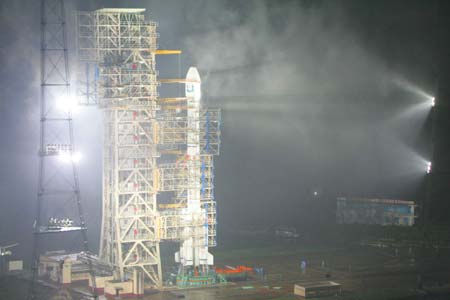China launches communications satellite for Nigeria
(Xinhua)Updated: 2007-05-14 09:14
XICHANG, Sichuan Province -- China on early Monday morning launched a communications satellite for Nigeria, the first of its kind in Africa and the first time a foreign buyer has purchased a Chinese satellite and its launching service.
The carrier rocket, Long March 3-B, blasted off from Xichang Satellite Launch Center in southwest China's Sichuan Province at 0:01 Monday and the northwest Xi'an Satellite Control center said the satellite had entered orbit accurately.
The Nigerian Communication Satellite, or NIGCOMSAT-1, is a super hybrid geo-stationary satellite designed to operate in Africa, parts of the Middle East and southern Europe.
The Nigerian government delegation present at the launching ceremony here include the Minister of Science and Technology and several other high-ranking officials.
The entire launching process and the ceremony was broadcast live from China by the Nigeria Television Authority.
Experts estimate that the satellite program will revolutionize telecommunications, broadcasting and broadband multimedia services in Africa.
It will create more than 150,000 jobs for Nigerians, save broadband users more than 95 million U.S. dollars a year, as well as providing Internet access to remote rural villages, and save more than 660 million U.S. dollars in phone call charges.
It is also expected to play key roles in e-commerce, improving government efficiency and promoting the development of the digital economy in Nigeria and throughout the entire African continent.
Hammed Rufai, managing director of the NIGCOMSAT-1 project, said the satellite would help Nigeria break free from its over-reliance on oil trade and transform itself into a knowledge-based economy.
A Nigeria space official earlier described the launch of the NIGCOMSAT-1 as "a monumental achievement for Nigerians" and "a beginning of economic and technological emancipation" of the entire African continent, Nigeria's Business Day reported last week.
The satellite will change positions in orbit until it is finally fixed at a longitude of 42 degrees east. It is expected to be put into use by Nigeria before the end of the year and has a lifespan of 15 years.
The satellite will be monitored and tracked by a ground station to be built in Abuja, the capital of Nigeria, by Chinese firm Great Wall Industry Corporation, and a ground station in Kashgar, in northwest China's Xinjiang Uygur Autonomous Region.
The satellite's ground facility in Abuja "had the potential of making Nigeria a major traffic hub in the west and central African region" and will prompt Nigeria and neighboring countries to "expand their switching facilities to be able to handle international traffic", according to a Nigerian communication official.
The Chinese company will offer support services and training for Nigerian technicians.
China was awarded the deal in 2004 after it outbid 21 international rivals to secure the 311 million U.S. dollar deal.
The satellite and carrier rocket were developed by the China Academy of Space Technology and China Academy of Launch Vehicle Technology, both under the China Aerospace Science and Technology Corporation.
The launch represents the 98th flight of China's Long March series of rockets.
The satellite represents China's wish to cooperate with developing countries in the peaceful use of outer space and to promote a closer relationship between China and African countries, observers say.
China has signed several cooperative contracts offering commercial launching services for foreign satellites, said an official on space development, citing a similar satellite contract with Venezuela in November 2005 and adding that China has been commissioned to send about 30 foreign satellites into space.
|
||
|
||
|
|

